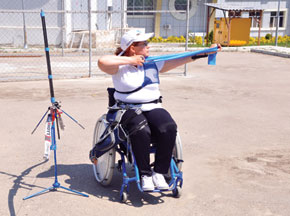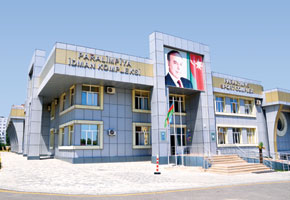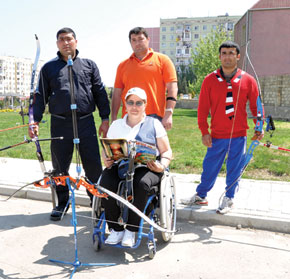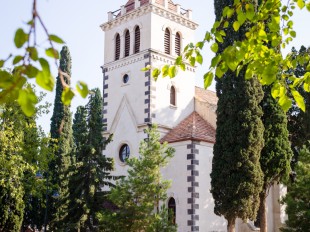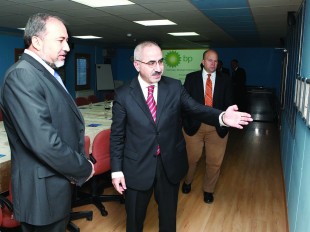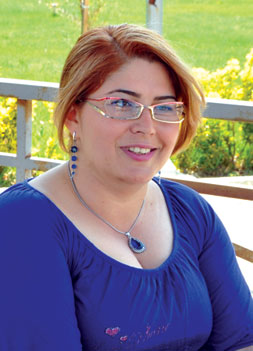 I met her at a reception organized by the British Embassy in Baku to mark 100 Days to Go to the London Olympics. Although she was not so prominent among the guests, her views on the 2012 Olympic Games in the 10-minute documentary reel produced by the British Embassy and presented at the reception were very impressive. She was certainly noticed following the presentation, I wished her good luck in her endeavours and this was how our very interesting conversation began. I decided to introduce her to a wider audience through Visions as she could serve as a role model not only for disabled people, in particular, disabled women, but for any woman in Azerbaijan as she is a very strong, positive person. full of energy and love for life.
I met her at a reception organized by the British Embassy in Baku to mark 100 Days to Go to the London Olympics. Although she was not so prominent among the guests, her views on the 2012 Olympic Games in the 10-minute documentary reel produced by the British Embassy and presented at the reception were very impressive. She was certainly noticed following the presentation, I wished her good luck in her endeavours and this was how our very interesting conversation began. I decided to introduce her to a wider audience through Visions as she could serve as a role model not only for disabled people, in particular, disabled women, but for any woman in Azerbaijan as she is a very strong, positive person. full of energy and love for life.The fall
Zinyet Veliyeva was born into a family of 10 children – two brothers and eight sisters - in the remote village of Kechili in Shamkir. She had a peaceful childhood with a very caring family until her father died of cancer in 1986.
My father’s death put an end to my carefree and peaceful childhood which was followed by the collapse of the Soviet Union a few years later and then the war over Karabakh. Like everybody in Azerbaijan, this affected my family a lot.
Life does not always treat us the way we wish or deserve. It is really full of surprises – good and bad. You can never predict what may happen. As such, the stress experienced by the family affected Zinyet more than anybody and resulted in her becoming disabled. At the age of 16, just two months before finishing secondary school, on her way back home from school she collapsed at the gate into their house. All the family was in shock, nobody understood what was wrong.
She could not move at all – she just felt like a pile of flesh. For three days they expected her to recover. But the stress she had endured through those years was too strong to allow her to recover without medical treatment. Seeing no change in her health her family took her to the doctor in the region. The result of the examination was not promising - she had had a spinal stroke and the three days without treatment. had not helped. There was a possibility that she would never recover. Her family took her to different doctors, but they all said virtually the same thing – she would never move, again, she would be bed-bound, only a miracle could help her.
No marks for the whellchair
Realising that there was no hope of help from the doctors, she collected her strength and decided to challenge the doctors with her stamina and belief. Thus, along with physiotherapy, she sent regular positive messages to her brain –
You are strong, Zinyet, you will recover, you will walk.
Her strong will and five years of regular physiotherapy took her, at the age of 22, to a position where she could look after herself. The problem that remained was with her legs – she could not walk. But this did not deter her. She thought about the many world famous people like Franklin Roosevelt, Professor Stephen Hawking, Muhammad Ali and others, and their achievements. Her thinking has always been:
We think with the brain, not with the legs. Thus, we are equal, whether we have legs, or not.
And with this philosophy, she decided to further her education. She passed the university admission tests and was admitted to the Azerbaijan Oil Academy where she studied for a Bachelor’s degree.
When I studied at the University, I would never allow the teachers to show me any favouritism because of my disability. I would always ask them to treat me equally with my fellow students.
Like all the other students, I would study hard to ‘earn my own marks, not marks for my wheel- chair. I also had very nice fellow students. I would often forget my disability with them as they would never feel sorry for me nor ashamed of me while joining me on the streets.
Thus she graduated from the University and returned to her native village.
Life there, particularly after the University, was not promising at all. As a disabled person she was considered unfit for work. No matter how supportive and understanding her family was and in spite of her optimistic nature, she was losing hope and becoming depressed at finding herself sitting at home all day and not contributing to society. She was there for 2 years - the hardest of her life, like being in a domestic asylum. Her fellow students never forgot her. They would constantly call her or post letters to support her any way they could.
The turning point
One day she received an invitation from one of them to her wedding in Baku. Although she was reluctant to go, her mother insisted, saying that it would be a change for her. In fact it was not just a change, but a turning point in her life. Her brother took her to Baku. She saw the changing capital and had mixed feeling of happiness and disappointment. She was happy to see her beloved city developing, but she was disappointed that she had to go back to the village where nothing challenging or attractive awaited her. She was, however, happy to be among her fellows who tried to encourage her and raise her hopes for better future. After the wedding she visited all her friends and thus stayed in Baku longer than planned.
When it was time to return to the village, everyone was disappointed. Then, suddenly, a suggestion from one of her friends – why not stay in Baku and look for a job? Why hadn’t she thought about it before? Zinyet immediately saw light at the end of the tunnel. But after a minute or two the light dimmed as she had neither place nor finance to stay in Baku. Her friends insisted that they would do their best to help her. First they started looking for a place.
Initially, whoever they called would be happy to rent their apartment to her. But when they met her, they would change their mind, offering lots of excuses. The good thing was that nobody told her they did not want her because of her disability. After about ten days’ search, she decided on one last attempt and to live with the result whatever it was. Thus, they called one more landlady and arranged a meeting. When the landlady saw her, it seemed she was to be turned down again. Suddenly, she remembered her philosophy. She asked the landlady,
Do you use your legs while thinking, making decisions, cooking, washing?
When she got the expected replies, she said:
I do the same. What is the difference between you and me, then? My disability? It has never been a problem for me. While it is not a problem for me, it will not be a problem for anybody else around me, I promise.
Wheelchair lawyer
Her philosophy worked, she softened the landlady’s heart and they agreed. Now she had an apartment to rent. The next step was to find a job. This was much more challenging. She went to many companies. Alas, everybody did their best to find an excuse not to hire her. She decided to teach herself employee rights and asked her friends to find the Labour Code of the Republic of Azerbaijan for her. She studied it carefully and referred to it during job interviews. Finally, she was hired by a newly established courier company called Royal Express. As work was very important for her, she would work long hours to complete tasks so that nobody could find fault with her disability. Thus, her colleagues found her a hard-working and quick-learning member of staff, full of positive energy. Now she is a role model for many people around her, with and without disabilities.
While studying at the Oil Academy, she would also try to raise public awareness about disabled people. Once she got an offer from OxFam, a British humanitarian organisation in Baku to film her in the city centre where she would ask different people about their attitude to disabled people. The answers were mixed, but many were pessimistic– a disabled person cannot work, is miserable, cannot marry, cannot go to university etc. Although she was only involved in the filming of the project, it raised her awareness of people’s attitudes towards disability, she became enthused and began advocating the rights of disabled people.
She did not want to be a victim of ignorance. She started teaching herself about the world’s celebrities who were disabled yet successful. And she decided to pursue a career in sport. In 1998 she had approached the Paralympic Committee and developed her skills in shooting.With hard work and stamina she became Republic shooting champion, in 1998. But when she had gone back to the village after graduation, she had had to leave the sport, too. Upon returning to Baku she decided to resume the sport. She went back to the Paralympic Committee.
Paralympic dream
They suggested that she change her sport which was very new in Azerbaijan. Thus, she took up archer. At first she found it very difficult. Shooting does not require much physical strength. But with a bow you must have physical strength to support 15 kilos. In spite of all these difficulties, she loved the sport very much. As for time to attend regular training, she was lucky, as her employer was very understanding and did everything possible to allow her to attend training three times a week. Hard work produced good results. Her trainers were very pleased with her efforts, as well as her skills. She won their confidence to enter international tournaments and this has opened a door for her to try for the Paralympic Games in London. She had to earn a place to participate in the London Games.
In August 2011 she participated in the archery World Championship in Turin, Italy. The qualifying score for the world championship was 1,000 points, but she achieved 1,138. She also participated in a tournament held near London in the same year to earn her place at the London Paralympic Games.
As we spoke she was in intensive training to achieve her goal – to come back from London with a medal.
The will, the way
Zinyet had the will – to represent her Motherland at international sport tournaments. With perseverance she has achieved her wish and participated in a series of international tournaments which in turn gave birth to another wish – to win a medal at the London Paralympic Games
It has been my dream since childhood to serve my nation, my country, how I could. Now there is an opportunity. My greatest wish is to win a medal at the Paralympic Games. While it is true that it is the dream of every sports person as an individual, my dream is also to have Azerbaijan’s tricolour flag raised and anthem played. People will not remember me, people will remember Azerbaijan.
We were coming to the end of the interview. Talking to her was so inspiring and interesting that we did not feel how time had flown. Before saying good bye and wishing her the best of luck, her final remarks were:
We had Nigar and Hajar riding horses, we had women leaders like Sara khatun, Nushaba and Tomris in our history. They served Azerbaijan together with the Azerbaijani men. I am their granddaughter. I will serve Azerbaijan as long as I live. Even if I do not achieve what I expect at the London Games, I have perseverance. I believe that one day I will win a gold medal for Azerbaijan!
We also believe that Zinyet will come back to Azerbaijan with a medal to gladden all those who love her and to prove: Where there is a will, there is a way....
